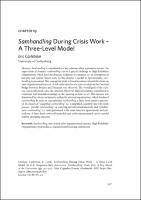Chapter 19 Samhandling During Crisis Work
A Three-Level Model
Abstract
"Samhandling is considered as a key solution when asymmetry occurs. An
expectation of seamless samhandling can be a special challenge to High Reliability
Organizations
which have mechanistic traditions in common, i.e. an assumption of
linearity and routine-based work. In this chapter, a model to operationalize samhandling
is presented. This conceptual study is based on observational data from an
inter-organizational exercise. A full-scale exercise of a train accident on the Öresund
Bridge between Sweden and Denmark was observed. The overall goal of the exercise
was to effectively solve the situation. However, different routines contributed to
confusion and misunderstandings in the meeting on how to act. The exercise was
dominated by a focus on linearity within the internal organizations, which hindered
samhandling. In order to conceptualize samhandling, a three-level model is presented.
It consists of “sequential samhandling”, i.e. a simplified, assembly-line type work
process, “parallel samhandling”, i.e. carrying out tasks simultaneously, and “synchronous
samhandling”, i.e. tasks performed at the same time in a spontaneous and natural
way. A three-level samhandling model such as the one presented can be a useful
tool for managing disasters."
Keywords
Samhandling; interaction; inter-organizational exercise; High Reliability Organizations; preparedness; organizational learning; unforeseenDOI
10.23865/noasp.36.ch19OCN
1076733007Publisher website
https://www.cappelendamm.no/Publication date and place
Oslo, 2018Classification
Society and Social Sciences
Warfare and defence
Military and defence strategy


 Download
Download